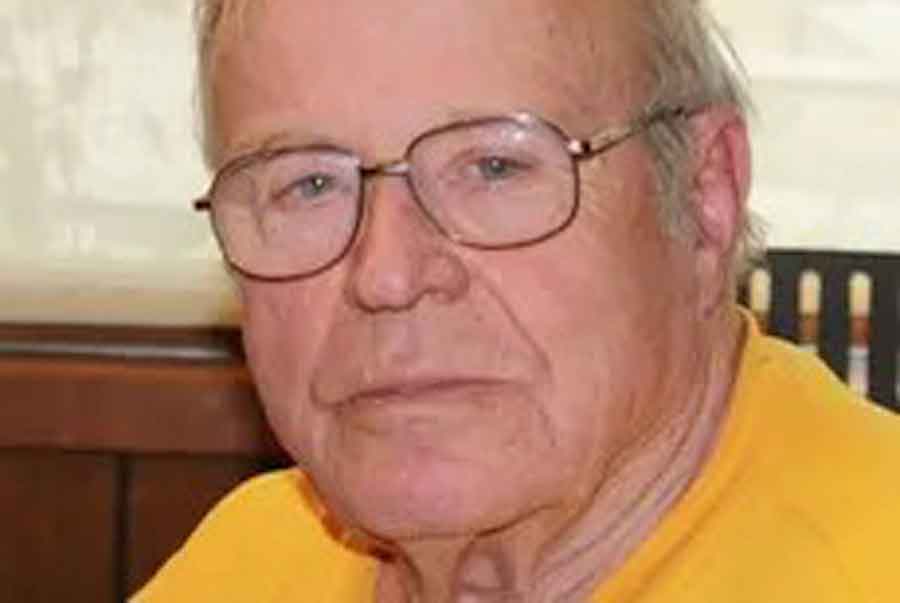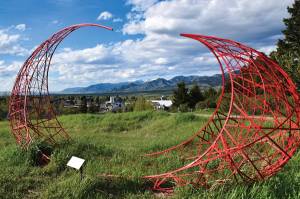By Todd Johnson
Robert Scott “Bob” McKinnon passed away on July 7th (see Great Falls Tribune Obituaries), and with his passing Great Falls has lost a fearless, six-decade civic champion. From his arrival to the Electric City in 1962 until he was too ill to continue this past April, McKinnon, along with his wife Suzy, selflessly and tirelessly devoted himself to championing Great Falls in his many avocations as a swim instructor and coach, multi-genre writer, and banjo player.
As a modern-day “Renaissance Man,” McKinnon was an acclaimed, yet humble master of many trades, and all citizens of Great Falls were the lucky beneficiaries of his generous, dedicated support. Whether you were one of the thousands who learned to swim in his backyard pool, one of the hundreds who swam competitively for him, one of the thousands who had him for English, one of the thousands who was compelled by his highly-entertaining books and plays, one of the thousands who marveled at his skillful banjo playing, or one of thousands who was simply a fan of his adventurous spirit, endless animal advocacy, and amazing civic service, you certainly benefitted from his fearless, enthusiastic, creative, expert approaches to everything he championed.
Your good fortune, Great Falls, happened completely by chance. Having taught for one year in Poplar, Montana, McKinnon, Suzy, and their young son Chris were headed to a new opportunity in Hawaii, where he would teach English and coach swimming at a private high school. On the way to the new job in the summer of ‘62, backyard lemonade with a shirtless, hard-working Superintendent of Great Falls Public Schools, Dr. Robert Farnsworth, convinced him to stay. Farnsworth knew good people, and deep in his heart, McKinnon wanted to stay in Montana. Win. Win.
From his earliest days as an English teacher at the old Paris Gibson Junior High School (now Paris Gibson Square), Bob McKinnon had big dreams with Great Falls as the stage. For example, he dreamed of instilling the lifelong joy of swimming and other water activities in Great Falls youth. He dreamed of bringing national caliber, California-style, competitive swimming to a football and basketball town. He dreamed of being one of the writers that students studied with his own books and plays filling Paris’s library shelves. He dreamed of bringing Dixie Land Jazz to a Country and Western town. He dreamed of his comedic plays being performed in front of big audiences. He also dreamed of supporting all underdogs, whether in his classroom, in the pool, at the dog pound, or in the nursing homes. But McKinnon wasn’t just a dreamer; he was a doer, and Great Falls would be the stage, and ultimately the beneficiary, of his biggest doings.
By the end of the 1960s, McKinnon’s dreams were coming true, and Great Falls, an integral part of the dreams, was beginning to reap the benefits and attention. When he wasn’t preparing for class, grading, and teaching English at Paris, and later at CMR, or helping Suzy to raise his children, Chris and Wendy, McKinnon was starting a successful swimming instruction program, coaching the Elks Swim Club and later, with his father Gus, the Great Falls Swim Team (with annual state and regional champions), writing his first book, Moose, Bruce, and the Goose (which was reviewed in The New York Times in 1969) raising racing greyhounds, honing his banjo skills at Shakey’s Pizza Parlor, and gaining attention as a fine chess player, all while representing, supporting, and championing Great Falls in combinations of ways it had never been championed.
McKinnon’s first decade in the Electric City was just a hint of what he would do and how the city would benefit. Through McKinnon’s swimming accomplishments in the next five decades, the city’s benefits were immeasurable. In 1971, he and Suzy would design and built their own backyard swimming pool and start a successful swimming instruction program that lasted forty-eight years, essentially saving many lives and instilling water skills and confidence in over 7000 children. They never had to advertise and had such loyal customers that McKinnon sometimes taught three generations in the same family. From the backyard pool, they also started Gus’s Guppies, another swim team that won several state championships, developed many high school and college swimmers, and initiated eventual careers for many swim instructors and swim coaches. Along with the Guppies, he coached the boys’ and girls’ swims teams at both CMR and GFHS for many years, winning several state championships. His swimmers were inspired by his incomparable coaching, but also by his own ongoing competitive swimming in master’s meets, where he represented Great Falls well and set many records that still exist.
For these things alone, Bob McKinnon should have received the keys to Great Falls. But there was so much more.
In the last five decades, Great Falls undoubtedly benefited from all of McKinnon’s other avocational accomplishments, too. For example, he wrote hundreds of short stories, mostly focused on the worlds of greyhounds and tropical fish, which fascinated his loyal Great Falls audience as well as a nationwide one. Furthermore, he wrote eighteen more books, many of which are set in Great Falls, the last being The Guppy Country Club, a memoir that recounts his lifelong love for swimming that he conveyed to so many in town. Moreover, he wrote several more plays, the last of which, The Tooth Fairy Came to Gopher Gulch, entertained happy audiences in Great Falls and Conrad. Lastly, he masterly strummed the banjo at venues around the city, state, and country, and maintained a regular gig at Eagles Manor, enlivening elderly audiences for over thirty years.
As evidenced by all the above and much more, Bob McKinnon was a superb citizen of Great Falls and one of its most magnificent, most fearless, most dedicated, and most lasting champions ever.
Thank you, Bob McKinnon. Thank you for all that you did for Great Falls. We will miss you. MSN










